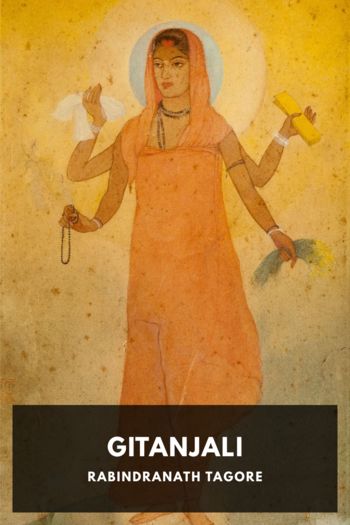My Reminiscences - Rabindranath Tagore (best ereader for pc txt) 📗

- Author: Rabindranath Tagore
Book online «My Reminiscences - Rabindranath Tagore (best ereader for pc txt) 📗». Author Rabindranath Tagore
Anyhow, when my father came, we would be content with wandering round about his entourage and in the company of his servants. We did not reach his immediate presence.
Once while my father was away in the Himalayas, that old bogey of the British Government, the Russian invasion, came to be a subject of agitated conversation among the people. Some well-meaning lady friend had enlarged on the impending danger to my mother with all the circumstance of a prolific imagination. How could a body tell from which of the Tibetan passes the Russian host might suddenly flash forth like a baleful comet?
My mother was seriously alarmed. Possibly the other members of the family did not share her misgivings; so, despairing of grown-up sympathy, she sought my boyish support. “Won’t you write to your father about the Russians?” she asked.
That letter, carrying the tidings of my mother’s anxieties, was my first one to my father. I did not know how to begin or end a letter, or anything at all about it. I went to Mahananda, the estate munshi.19 The resulting style of address was doubtless correct enough, but the sentiments could not have escaped the musty flavour inseparable from literature emanating from an estate office.
I got a reply to my letter. My father asked me not to be afraid; if the Russians came he would drive them away himself. This confident assurance did not seem to have the effect of relieving my mother’s fears, but it served to free me from all timidity as regards my father. After that I wanted to write to him every day and pestered Mahananda accordingly. Unable to withstand my importunity he would make out drafts for me to copy. But I did not know that there was the postage to be paid for. I had an idea that letters placed in Mahananda’s hands got to their destination without any need for further worry. It is hardly necessary to mention that, Mahananda being considerably older than myself, these letters never reached the Himalayan hilltops.
When, after his long absences, my father came home even for a few days, the whole house seemed filled with the weight of his presence. We would see our elders at certain hours, formally robed in their chogas, passing to his rooms with restrained gait and sobered mien, casting away any pan20 they might have been chewing. Everyone seemed on the alert. To make sure of nothing going wrong, my mother would superintend the cooking herself. The old mace-bearer, Kinu, with his white livery and crested turban, on guard at my father’s door, would warn us not to be boisterous in the verandah in front of his rooms during his midday siesta. We had to walk past quietly, talking in whispers, and dared not even take a peep inside.
On one occasion my father came home to invest the three of us with the sacred thread. With the help of Pandit Vedantavagish he had collected the old Vedic rites for the purpose. For days together we were taught to chant in correct accents the selections from the Upanishads, arranged by my father under the name of “Brahma Dharma,” seated in the prayer hall with Becharam Babu. Finally, with shaven heads and gold rings in our ears, we three budding Brahmins went into a three-days’ retreat in a portion of the third storey.
It was great fun. The earrings gave us a good handle to pull each other’s ears with. We found a little drum lying in one of the rooms; taking this we would stand out in the verandah, and, when we caught sight of any servant passing alone in the storey below, we would rap a tattoo on it. This would make the man look up, only to beat a hasty retreat the next moment with averted eyes.21 In short we cannot claim that these days of our retirement were passed in ascetic meditation.
I am however persuaded that boys like ourselves could not have been rare in the hermitages of old. And if some ancient document has it that the ten or twelve-year old Saradwata or Sarngarava22 is spending the whole of the days of his boyhood offering oblations and chanting mantras, we are not compelled to put unquestioning faith in the statement; because the book of Boy Nature is even older and also more authentic.
After we had attained full Brahminhood I became very keen on repeating the Gayatri.23 I would meditate on it with great concentration. It is hardly a text the full meaning of which I could have grasped at that age. I well remember what efforts I made to extend the range of my consciousness with the help of the initial invocation of “Earth, firmament and heaven.” How I felt or thought it is difficult to express clearly, but this much is certain that to be clear about the meaning of words is not the most important function of the human understanding.
The main object of teaching is not to explain meanings, but to knock at the door of the mind. If any boy is asked to give an account of what is awakened in him at such knocking, he will probably say something very silly. For what happens within is much bigger than what he can express in words. Those who pin their faith on University examinations as a test of all educational results take no account of this fact.
I can recollect many things which I did not understand, but which stirred me deeply. Once, on the roof terrace of our riverside villa, my eldest brother, at the





Comments (0)